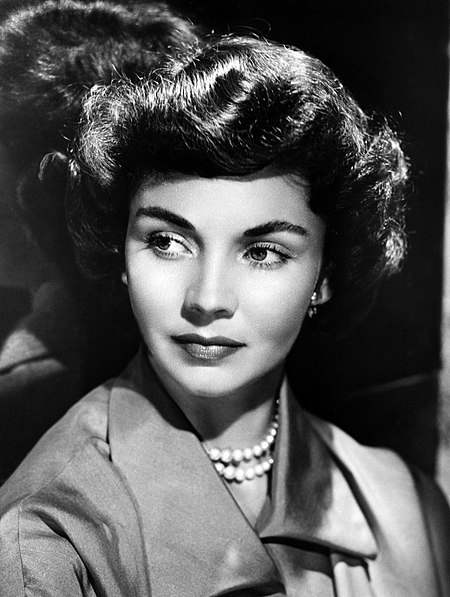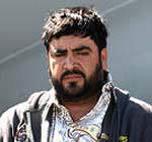Nicolai Gedda
| |||||||||||||
Read other articles:

This article needs attention from an expert in Royalty. The specific problem is: sources for the officeholders and their tenure dates are requested. See the talk page for details. WikiProject Royalty may be able to help recruit an expert. (February 2022) The Royal Households of the United Kingdom consist of royal officials and the supporting staff of the British royal family, as well as the Royal Household which supports the Sovereign. Each member of the Royal Family who undertakes public dut...

Jennifer JonesJones pada tahun 1953LahirPhylis Flora IsleyPekerjaanAktrisTahun aktif1939–1974Suami/istriRobert Walker(1939-1945) berceraiDavid O. Selznick(1949-1965) ditinggal matiNorton Simon(1971-1993) ditinggal mati Phylis Lee Isley a.k.a. Jennifer Jones (2 Maret 1919 – 17 Desember 2009) adalah seorang aktris berkebangsaan Amerika Serikat yang memenangkan Academy Award dan Golden Globe. Dia dilahirkan di Tulsa, Oklahoma. Dia berkarier di dunia film sejak tahun 1939 h...

Este artículo o sección necesita referencias que aparezcan en una publicación acreditada.Este aviso fue puesto el 3 de febrero de 2019. Graham Nash Graham Nash en 2018.Información personalNombre de nacimiento Graham William NashNacimiento 2 de febrero de 1942 (81 años)Blackpool, Lancashire, Inglaterra, Reino Unido Reino UnidoNacionalidad Británica y estadounidense (desde 1978)Información profesionalOcupación Cantautor, guitarrista y músico Años activo 1958 - presenteG...

Dachigam-Nationalpark Im Hintergrund die Berge des Dachigam-NationalparkIm Hintergrund die Berge des Dachigam-Nationalpark Dachigam-Nationalpark (Jammu und Kashmir) 34.1475.02Koordinaten: 34° 8′ 24″ N, 75° 1′ 12″ O Lage: Jammu und Kashmir, Indien Nächste Stadt: Srinagar Fläche: 147 km² i3i6 Der Dachigam-Nationalpark liegt im Norden Indiens, im Unionsterritorium Jammu und Kashmir etwa 22 km von Srinagar entfernt. Bekannt ist der Nationalpark...

Alfredo Beltrán Leyva Información personalNacimiento 21 de enero de 1971 (52 años) Badiraguato, Sinaloa, México=Nacionalidad MexicanaCaracterísticas físicasAltura 1,89 mInformación profesionalOcupación NarcotraficanteInformación criminalCargos criminales Líder del Cártel de los Beltrán-LeyvaSituación penal sentenciado a cadena perpetua[editar datos en Wikidata] Alfredo Beltrán Leyva El Mochomo (n. Badiraguato, Sinaloa; 21 de enero de 1971) es un capo de una organi...

هذه المقالة يتيمة إذ تصل إليها مقالات أخرى قليلة جدًا. فضلًا، ساعد بإضافة وصلة إليها في مقالات متعلقة بها. (أبريل 2019) جاي تشوي معلومات شخصية الميلاد 30 سبتمبر 1983 (40 سنة) مواطنة الولايات المتحدة الحياة العملية المدرسة الأم جامعة نيومكسيكو المهنة لاعب غولف الرياضة...

桑田 佳祐出生名 桑田 佳祐別名 嘉門 雄三[注釈 1][2] 桑竹 居助[注釈 2][3] JOHN PAUL MacLENNON[注釈 3][2] 夷撫 悶汰[注釈 4][2] 古賀 紅太[注釈 5][2] 波乗亭 米祐[注釈 6][11] 稲川ジェーン・フジオカ[注釈 7][12] 紫苑 小煉[注釈 8][13]生誕 (1956-02-26) 1956年2月26日(67歳)[14]出身地 日本・神

Nota: Este artigo é sobre o programa de televisão brasileiro. Se procura pela telenovela portuguesa, veja Mulheres (telenovela). Esta página cita fontes, mas que não cobrem todo o conteúdo. Ajude a inserir referências. Conteúdo não verificável pode ser removido.—Encontre fontes: ABW • CAPES • Google (N • L • A) (Novembro de 2014) Mulheres Mulheres (programa de televisão) Informação geral Também conhecido(...

Kapuas |Pulang Pisau |Kota Palangka Raya |Gunung Mas --- --- --- Tanah Biaju atau negeri Biaju adalah sebuah nama wilayah historis di Daerah Aliran Sungai Kahayan dan sungai Kapuas Murung di Kalimantan Tengah menurut sejarah Kesultanan Banjar. Dalam masa pemerintahan Raja Banjar Sunan Nata Alam nama wilayah Biaju atau Tanah Biaju masih digunakan selanjutnya pada masa pemerintahan Raja Banjar Sultan Sulaiman diganti namanya menjadi Tanah Dayak (termasuk DAS Sebangau) seperti tertulis dalam Kon...

Margaret of Antioch-Lusignan (French: Marguerite; c. 1244 - 30 January 1308), also known as Margaret of Tyre, was an Outremer noblewoman who ruled the Lordship of Tyre in the Kingdom of Jerusalem. A member of the House of Antioch-Lusignan, she married John of Montfort, Lord of Tyre, and was granted rule of the city as widow in 1284. She concluded a truce with the Egyptian sultan Al-Mansur Qalawun and ruled until 1291, when she ceded the lordship and moved to Cyprus. Dynastic position Margaret...

Airport in Sacramento County, California, United States For the military use of this facility before 1993, see Mather Air Force Base. Sacramento Mather AirportUSGS photo, 17 August 1998IATA: MHRICAO: KMHRFAA LID: MHRSummaryAirport typePublicOwnerSacramento CountyServesSacramento, CaliforniaElevation AMSL98 ft / 30 mCoordinates38°33′14″N 121°17′51″W / 38.55389°N 121.29750°W / 38.55389; -121.29750Runways Direction Length Surface ft m 04R/22L 11...

Artikel ini bukan mengenai Pemimpin Tertinggi (disambiguasi). Tiongkok Artikel ini adalah bagian dari seri Politik dan KetatanegaraanTiongkok Kepemimpinan Generasi kepemimpinan Kepemimpinan kolektif Pemimpin tertinggi Kepemimpinan inti Kepemimpinan sekarang Pemerintahan Xi-Li Pemimpin nasional Presiden (daftar): Xi Jinping Wakil Presiden (daftar): Li Yuanchao Pemimpin provinsi Partai Komunis Sejarah Organisasi Kongres Nasional Partai (ke-18) Komite Pusat (ke-18) Sekretaris Jenderal (daftar) X...

French films released in 1928 Cinema ofFrance 1892–1909 1910s 1910 1911 1912 1913 19141915 1916 1917 1918 1919 1920s 1920 1921 1922 1923 19241925 1926 1927 1928 1929 1930s 1930 1931 1932 1933 19341935 1936 1937 1938 1939 1940s 1940 1941 1942 1943 19441945 1946 1947 1948 1949 1950s 1950 1951 1952 1953 19541955 1956 1957 1958 1959 1960s 1960 1961 1962 1963 19641965 1966 1967 1968 1969 1970s 1970 1971 1972 1973 19741975 1976 1977 1978 1979 1980s 1980 1981 1982 1983 19841985 1986 1987 1988 1989...

German actor and director (1888–1954) Reinhold SchünzelReinhold Schünzel in 1921Born7 November 1888Hamburg, German EmpireDied11 November 1954 (1954-11-12) (aged 66)Munich, West GermanyOccupation(s)Actor, director, writer, producerYears active1916–1954 (film) Reinhold Schünzel (7 November 1888 – 11 November 1954) was a German actor and director, active in both Germany and the United States. The son of a German father and a Jewish mother, he was born in St. Pauli, the po...

Hindu community found in North India For the Muslim community, see Jogi Faqir. For a practitioner of yoga, see Yogi. For other uses, see Jogi (disambiguation). A yogi seated in a garden, North Indian or Deccani miniature painting, c.1620-40 The Jogi (also spelled Jugi or Yogi)[1][2] is a Hindu community found in North India. Jogi surname is associated with the ancient migrants of the southern Indian states Karnataka, Andhra Pradesh, Tamil Nadu, and Kerala and Gujarat. They are...

Pour la région, voir Beaufortain. Cet article est une ébauche concernant la montagne. Vous pouvez partager vos connaissances en l’améliorant (comment ?) selon les recommandations des projets correspondants. Massif du Beaufortain Massifs des Alpes occidentales 1 2 3 4 5 6 7 8 9 10 11 12 13 14 15 16 17 18 19 20 21 22 23 24 25 26 27 28 29 30 31 32 33 34 35 36 37 38 39 Légende 1 : Massif du Chablais 2 : Massif du Giffre 3 : Aiguilles Rouges 4 : Massif des Bornes...

Part of a series on the History of Cape Verde Colonial history Portuguese Cape Verde Portuguese Empire Immigration to the USA Atlantic slave trade Famine in Cape Verde Independence struggle African Party for the Independence of Guinea and Cape Verde African Party for the Independence of Cape Verde Portuguese Colonial War vte The following is a timeline of the city of Praia, capital of Cape Verde. Colonial era See also: Timeline of Portuguese Cape Verde 1460 - The island of Santiago was discov...

This article is an orphan, as no other articles link to it. Please introduce links to this page from related articles; try the Find link tool for suggestions. (May 2017) 2016 American filmTHE DARK DAYSDirected byDavid A. MaloneWritten byDavid A. MaloneProduced by Bernard Malone David A. Malone Denita Malone Cory Novak Starring James Mullaney Malissa Williams Cobie Moses Jordan A. Baner Cory Novak CinematographyClayton JamesEdited byJoel MatzenbacherMusic by Dylan Dunlap Noah Goodman The Great...

Suburb in Dunedin, New ZealandMacandrew BaySuburbMacandrew BayCoordinates: 45°52′S 170°36′E / 45.867°S 170.600°E / -45.867; 170.600CountryNew ZealandCityDunedinLocal authorityDunedin City CouncilCommunity boardOtago Peninsula Community Board[1][2]Area[3] • Land258 ha (638 acres)Population (June 2023)[4] • Total1,630 (Otago Harbour) Company Bay Macandrew Bay Challis Pukehiki The Otago Harbour...

Commune and town in In Salah Province, AlgeriaAin Salah إن صالحIn Salah; I-n-Salah; 'Ayn ṢalihCommune and townCity gate of Ain Salah.Location of In Salah commune within In Salah ProvinceAin SalahLocation of In Salah within AlgeriaCoordinates: 27°11′42″N 2°29′0″E / 27.19500°N 2.48333°E / 27.19500; 2.48333Country AlgeriaProvinceIn Salah ProvinceDistrictIn Salah DistrictArea • Total32,518 km2 (12,555 sq mi)Elevation293&#...

